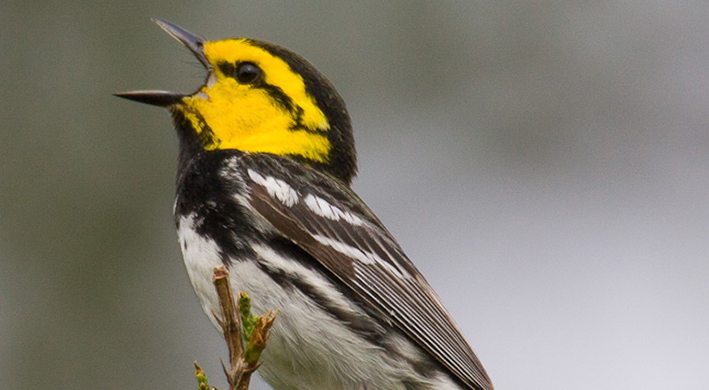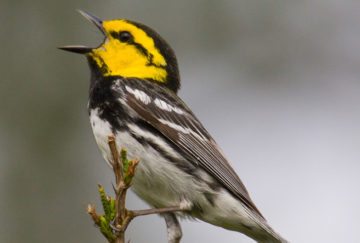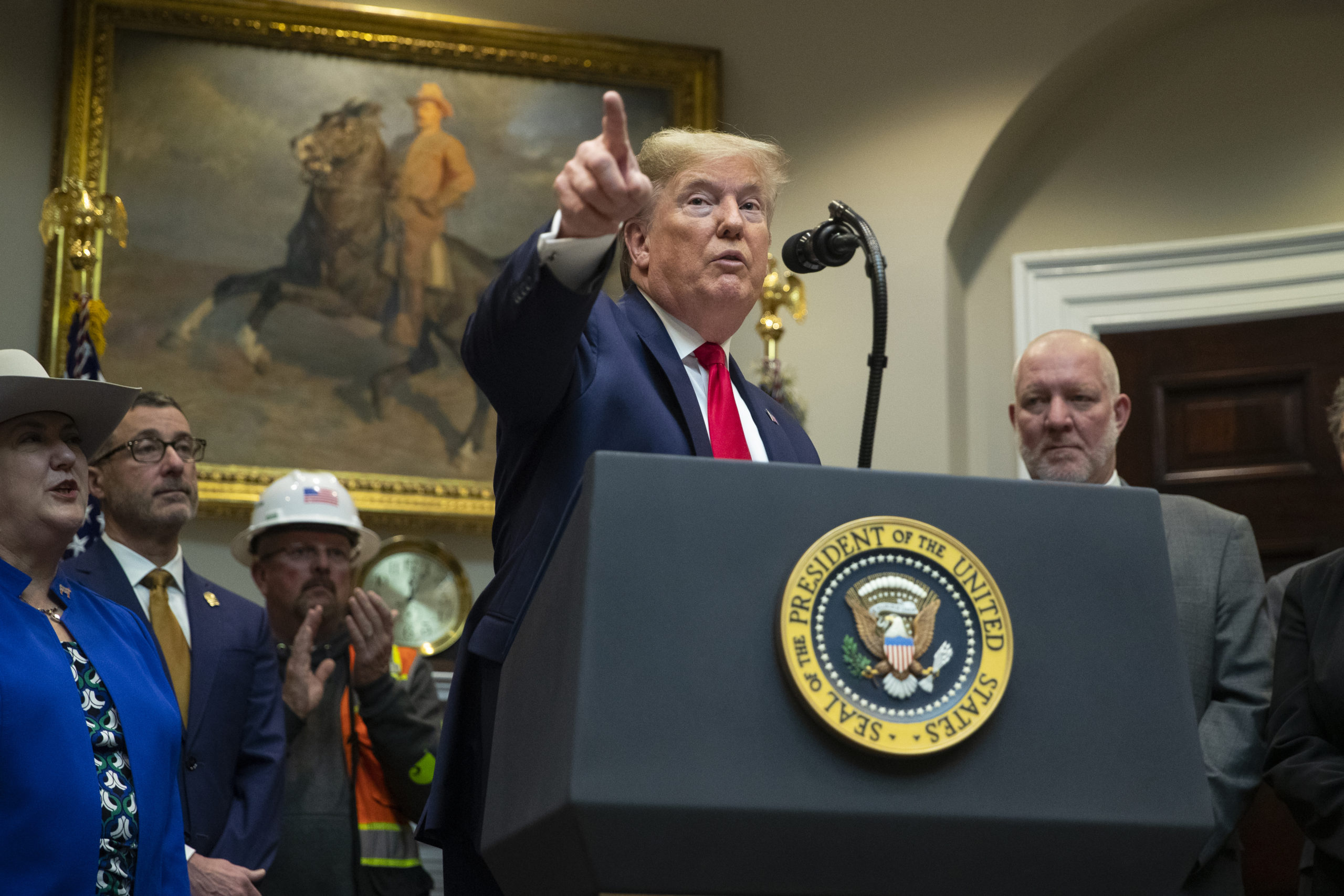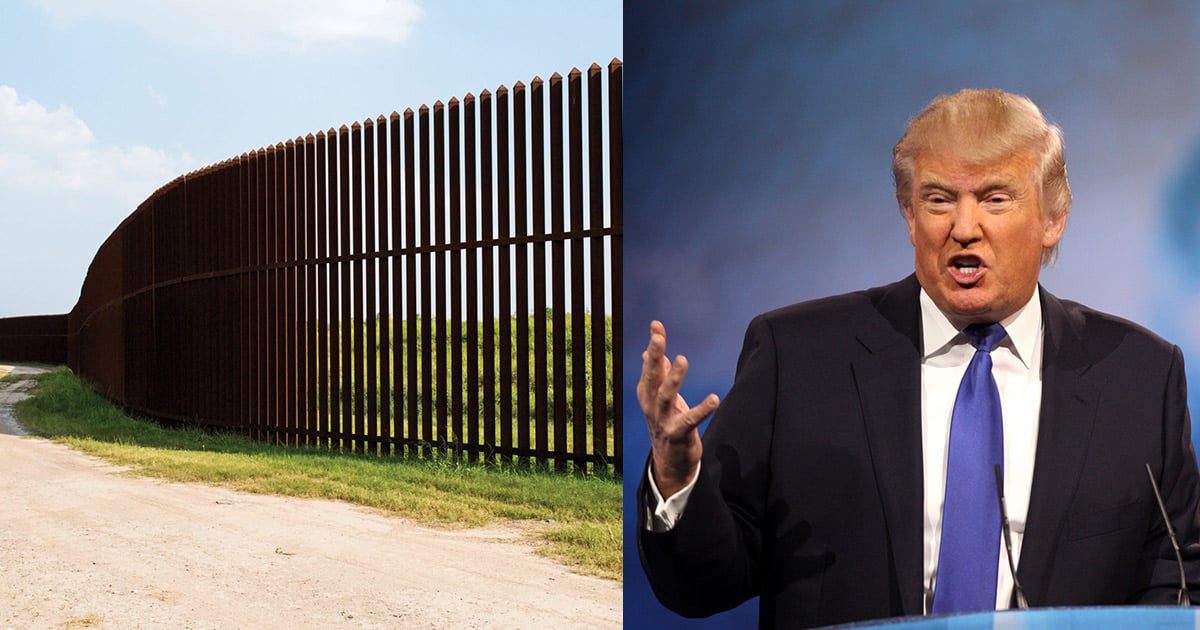
Texas Warbler Suit Could Test Trump Administration’s Handling of Endangered Species
A little Texas bird could become a test case for the Trump administration’s willingness to defend Obama-era endangered species decisions.


male sings in Williamson County. U.S. Fish and Wildlife Service
Several prominent environmental organizations are citing the Trump’s administration’s hostility toward the Endangered Species Act as the reason for stepping into a legal fight over the golden-cheeked warbler, a little songbird native to Texas. The warbler could become a test case of how willing the Trump administration is to defend Obama-era endangered species decisions, they said.
In June, the Texas General Land Office sued the U.S. Department of Fish and Wildlife (FWS), arguing that the warbler’s protected status was decreasing the value of property that the agency leases throughout the state. As a result, the agency’s ability to collect revenues for public education was harmed, the suit claimed. This week, the Center for Biological Diversity, Defenders of Wildlife, Travis Audubon Society and Texas Ornithological Society petitioned a federal court in Austin to allow them to intervene in the lawsuit.
“Given the change in presidential administration, it is also at least questionable whether FWS will vigorously defend against Plaintiff’s claims,” their filing states. “Currently, all indications suggest the Trump administration intends to scale back environmental protections.”
In July, the Department of Interior announced that one of the agency’s major priorities includes lessening or removing protections for dozens of endangered species, including the Sierra Nevada red fox and the Pacific walrus. Trump has also nominated former Texas comptroller and longtime endangered species opponent Susan Combs to a prominent position in the Interior Department. Those moves, environmental groups say, don’t bode well for the golden-cheeked warbler.
“Our greatest fear is that the Trump administration may cave and say ‘OK, OK, we will re-open the decision on this bird,’” said Bryan Bird, director of the Defenders of Wildlife’s southwest program. “We have to intervene so that the bird has legal representation.”
The warbler has long been in the crosshairs of Texas politicians and development interests. Last year, the warbler held up construction of the Texas 45 Southwest toll road, a project that environmental groups claim would have harmed the bird’s habitat if work had proceeded during the summer nesting season. The warbler was also a pet issue for Susan Combs during her tenure as Texas comptroller. According to the Austin American-Statesman, in 2015, a Fort Hood general initially claimed warbler habitat protections didn’t affect military readiness but later reversed his position after a call from Combs.
The General Land Office is represented pro bono by Robert Henneke, the general counsel for the corporate-funded Texas Public Policy Foundation. Along with Combs, Texans for Positive Economic Policy and the Reason Foundation, Henneke petitioned FWS to de-list the warbler once before in 2015. In the petition, they argued that critical habitat had increased dramatically since the 1990s when the bird was listed and was sufficient to support a healthy warbler population. Henneke is making the same argument in the General Land Office lawsuit.
“Based on [Texas A&M’s] independent scientific study, the conclusion was that the warbler population and habitat were above the level where the warbler was threatened or endangered,” Henneke told the Observer. “With this matter being a success story for conservation, there’s not a lawful basis to keep the bird listed.”
But FWS declined to de-list the warbler last year, noting that the Texas A&M study provided new estimates of warbler populations, but “do not imply recovery.”
“Habitat destruction, fragmentation and degradation remain a real and significant threat to the continued existence of the warbler,” the agency wrote in its decision.
Now, Henneke is trying again. The agency’s decision not to consider de-listing last year “had to do more with the politics of the [Obama] administration,” he told the Observer. Henneke also said it’s inappropriate for environmental groups to seek intervenor status in the case. “The reason they’re intervening is that [they’re worried] the law will be followed,” he said. “Their proper role is to go speak with members of Congress on changing the law instead of jumping into lawsuits.”
Environmental groups, however, see Henneke’s second attempt to de-list the warbler as opportunistic. “They’ve been waiting for the perfect administration to bring it,” said Bird, and in Trump, Henneke may have found a friendly government.
“All of their political appointments are giving us indications that they’re not going to be particularly friendly for the Endangered Species Act,” Bird said. “We know Congress’ majority party isn’t friendly. It could be a perfect storm.”


